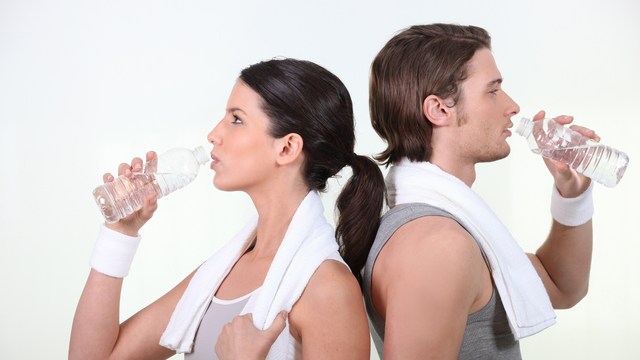 Auremar/PhotoSpin
Auremar/PhotoSpin
Ahh, summertime. Longer days, warmer weekends and longer heat waves. These are the things we will enjoy and endure. It is important to take precautions, especially when outdoors, as the temperature rises or we could find ourselves or our loved ones in serious trouble.
According to the Red Cross, “In recent years, excessive heat has caused more deaths than all other weather events, including floods.”
For that reason, the Centers for Disease Control and Prevention has suggestions for dealing with the heat, especially when exercising. “Limit outdoor activity, especially midday when it is the hottest part of the day. The CDC also suggests to schedule workouts and practices earlier or later in the day to avoid midday heat.”
According to The American College of Sports Medicine, proper hydration needs to team up with proper nutrition. Your diet also effects water requirements.
“Body water is replaced by beverage consumption and by ingestion of foods that contain water. A balanced diet that provides about 2500 to 3000 kcal will generally provide about 1 liter of water per day from food alone. In addition, the consumption of food stimulates drinking.”
Make sure you bring enough water or sports drinks with you when exercising. If you’re going for an extra long bike ride or hike, be sure to pack extra.
Do not go alone in the extreme heat. And keep in mind, the more you sweat, the more you are going to have to replenish.
The Red Cross also advises that you don't just go by the temperature on the thermometer. The heat index could be making it feel hotter. “The heat index is the temperature the body feels when the effects of heat and humidity are combined. Exposure to direct sunlight can increase the heat index by as much as 15° F.”
It is also important that no matter what your age or gender that you pay attention to heat-related illness warnings, which according to the CDC, “include dizziness, nausea, headaches, dehydration and vomiting.”
The Red Cross cautions that severe consequences including death can occur if warning signs of heat-related illness are not dealt with immediately.
Online References:
“Heat Wave – Redcross.org.” The Red Cross. Web 20 June 2013.
http://www.redcross.org/prepare/disaster/heat-wave
“Extreme Heat and Athletes – CDC.Gov.” The Centers For Disease Control and Prevention. Web 20 June 2013.
http://www.cdc.gov/nceh/extremeheat/athletes.html
“Hydration and Physical Activity – ACSM.org.” The American College of Sports Medicine. Web 20 June 2013.
http://www.acsm.org/docs/publications/Roundtable%20on%20Hydration%20and%20Physical%20Activity.pdf
Joanne Sgro-Killworth is a Television Fitness Expert, Certified Personal Trainer and Sport Nutritionist. She is Certified in Pilates, Pre-natal/Post-Partum, Yoga and Senior Fitness. She specializes in Weight Loss, Post-Rehab and Post Cancer Training.
Joanne's fitness plans and recipes are available globally on her website www.fitnessanswer.com/ She resides in the Phoenix, AZ area with her husband and son, where she runs her personal training business, Fitness Answer, LLC.
Reviewed June 21, 2013
by Michele Blacksberg RN
Edited by Jody Smith



Add a CommentComments
There are no comments yet. Be the first one and get the conversation started!